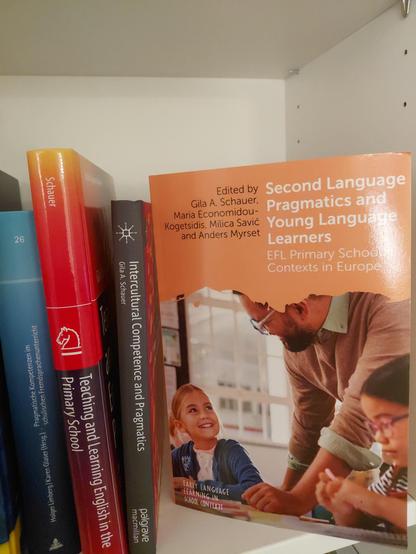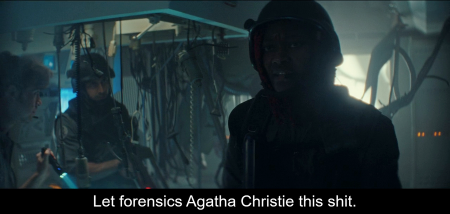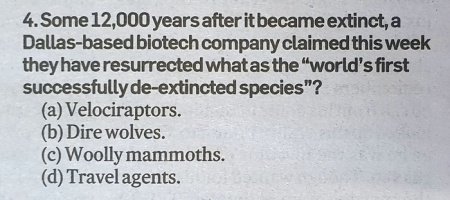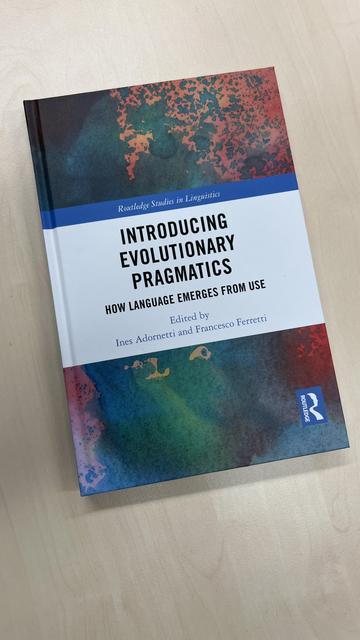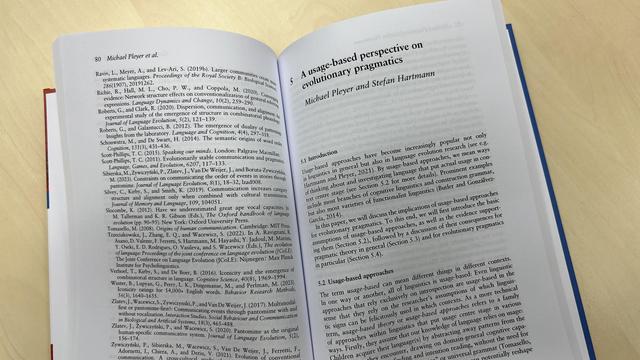I am delighted that our edited volume "Second Language #Pragmatics and Young Language Learners - #EFL #Primary #School Contexts in #Europe" is now available https://www.multilingual-matters.com/page/detail/second-language-pragmatics-and-young-language-learners/?SF1=work_id&ST1=CVIEW-67d2c2f691716. We are very gratetful to our contributors who accompanied us on this journey!
#pragmatics
I wrote a little about Agatha Christie – as a verb
https://stancarey.wordpress.com/2025/10/11/to-agatha-christie-v-tr/
#language #AlienEarth #AgathaChristie #slang #writing #blog #verbs #verbing #LanguageChange #pragmatics
to Agatha Christie (v.tr.)
The conversion of nouns to verbs (to impact, to medal, to leverage, to architect) is a continual object of criticism and word rage. But language has been verbing for as long as it has languaged. In fact, there’s nothing that can’t be verbed if you put your mind to it.
‘What about someone’s name?’ you might ask. ‘What about Agatha Christie?’
I’m glad you picked that example. Because the new FX series Alien: Earth offers this great line in its second episode, ‘Mr. October’ (a mild swear word follows):
Context, with a tiny spoiler in the first line:
In the year 2120, a military search-and-rescue team are investigating a spaceship that has crashed to Earth. When a grisly but intriguing discovery threatens to detain them unduly, Siberian (played by Diêm Camille) makes the call to keep moving:
Okay, come on. We’re search and rescue. Let forensics Agatha Christie this shit.
To Agatha Christie something, then, is to figure it out; to investigate and solve a puzzling problem in the manner of Miss Marple or Hercule Poirot, Christie’s fictional detectives.
I like this verbing because it reads like improvised slang. There’s no suggestion that the phrase has currency as a verbal eponym, whether broadly in-world or more specifically in Siberian’s own usage or that of one of her speech communities. Rather, it’s an impromptu linguistic innovation that’s both playful and bookish.
It also celebrates Christie’s enduring popularity as a mystery author. What other name could fit in this semantic slot? Only a fictional one, I think: Sherlock Holmes, Philip Marlowe, or Sam Spade – but not Arthur Conan Doyle, Raymond Chandler, or Dashiell Hammett.
Other contenders include Jessica Fletcher, Perry Mason, Columbo, Jules Maigret, Nancy Drew, Inspector Morse, and Special Agent Dale Cooper. But it’s more of a stretch to imagine them being so culturally salient in a century’s time.
Alien: Earth was created by Noah Hawley, who also has the writing credit on the episode. He’s probably not even the first person to verb Agatha Christie, but for once I didn’t bother trying to Agatha Christie it.
Updates:
A couple of nice examples from Bluesky: @iucounu tells me his wife uses Poirot as a verb: ‘”Don’t worry, I’ll Poirot that,” she says, when she’s going to ferret out some bit of gossip’.
And Jesse Sheidlower sent me this verbing of Agatha Christie in Ryan Rayston’s novel The Quiet Sound of Disappearing (2011):
*
Further reading:
In my A–Z of English usage myths, I wrote that peevers hate verbing, but only when they think it’s new – they constantly use verbings that were established earlier. Who remembers all the yelling and wailing over contact (v.)? Who would believe there even was such a controversy?
See also: ‘Verb all the things’; ‘Verbing weirds language – but in a good way’; and ‘Verbing and nouning are fine and here’s a quiz‘. And a few other posts about detective fiction.
#AgathaChristie #AlienEarth #conversion #detective #detectiveFiction #eponyms #humour #language #languageChange #NoahHawley #pragmatics #screenwriting #semantics #slang #TV #verbing #verbs #writing
Reposted #Introduction: I’m a #Linguistics professor in #Texas. Originally from #Chicago. Lived in Birmingham, UK & Hefei (Anhui province) #China. I do research in English lexical semantics, #pragmatics, health communication, and discourse markers, using corpus methods. Currently learning #Arabic on #DuoLingo. I edit #Wikipedia. I love contemporary fiction, science fiction, and #poetry. And #travel—as the budget allows. Loved my academic Twitter network. Great meeting you all!
'Imam al-Farahi's Pragmatics Study of the Language of the Qur'an–Analytical approach' - a new Ansaq Journal article on #ScienceOpen:
🔗 https://www.scienceopen.com/document?vid=4d5ca9a9-f129-4aca-bfbb-c5313afb00c2
#QuranicLinguistics #Pragmatics #QuranicStudies #TafsirStudies
Call for Short Papers (Posters): SemDial 2025 – The 29th Workshop on the Semantics and Pragmatics of Dialogue (Bialogue), September 3–5, 2025
Submit your short paper/poster to #SemDial2025 and come to Bielefeld! Submission deadline is July 18th, 23:59 UTC -12h (“Anywhere on Earth”).
For more information see https://semdial2025.github.io/
🦜 Gossip, redefined: Research shows the surprising power of positive talk in teams
https://phys.org/news/2025-06-gossip-redefined-power-positive-teams.html
#work #teamwork #pragmatics #communication #psychology #socialpsychology #gossip
I can only conclude that the cookies contain meat. #pragmatics #linguistics #implicatures
Hey, French speakers, if I said "j'ai une collection de cheval" or "j'ai plusieurs cheval" does that sound acceptable to you?
(I am not interested in whether you were taught in school if it was correct or not. I want to know if YOU think it sounds fine or if you would immediately be like "hein?" if you *heard* someone say that.)
Sales guy was upspeaking and that was annoying as hell to me.
hrmm https://www.shortform.com/blog/voice-and-tone/
The trouble with dangling modifiers
On many vexed matters of English usage, people can be divided into the following groups:
1. those who neither know nor care
2. those who do not know, but care very much
3. those who know and condemn
4. those who know and approve
5. those who know and distinguish.
Thus with wry wit did H. W. Fowler address the existence of split infinitives in his landmark usage dictionary of 1926. He concluded that the first group ‘are the vast majority, and are a happy folk, to be envied by most of the minority classes’.
Dangling catkins in the rural west of Ireland
Even more people are happily unaware of dangling or misplaced modifiers. I mean this kind of thing: Cycling downhill, a truck almost hit me. The writer was cycling, but the grammar implies, absurdly, that the truck was. Or: Born in India, Diya’s education took her to Europe. Diya was born in India, but the line says her education was.
As a copy-editor I’m in category 5: I routinely edit danglers to accord with the norms of formal written English. But they’re not always a flagrant error, and they’ve occurred in English since at least Chaucer’s day.
Let’s take a closer look.
(A note on terminology: The modifier is typically a participle but may be a clause, an infinitive, a gerund, etc. It may be described as dangling, hanging, confused, misplaced, misattached, unattached, unrelated, misrelated, etc. – though, depending on the source, ‘dangling’ and ‘hanging’ may apply only when the intended subject is implied, not just unattached. As a general shorthand, there’s ‘danglers’.)
Many danglers cause little or no harm and are ambiguous only with a feat of imagination. For example:
While replying to your email, the doorbell rang.
The dangling gerund suggests that the doorbell was replying to the email, but it’s commonsensical to infer that the writer was doing so. The questionable grammar is likely to go unnoticed and unremarked upon in informal contexts but might be fixed if the prose were edited:
While I was replying to your email, the doorbell rang.
Sometimes what’s attached to the dangler is not a noun but a dummy ‘it’ or ‘there’:
Looking over the results, there seems to be a consensus.
Who was looking over the results is unclear from the isolated sentence, but it’s probably obvious in context. Dangling participles like this draw the attention of readers sensitized to the problem, such as editors, sticklers, and grammatically versed readers, but go unnoticed by the majority.
To open the lid, it must be pushed down, then turned counter-clockwise.
This dangling infinitive could be phrased more grammatically (To be opened, the lid must…; To open the lid, you must push it down…), but there’s no real confusion or difficulty. As G. H. Vallins writes of the general structure in The Pattern of English (1956), ‘provided the result is not patently incongruous, it is not too lightly to be condemned’.
Some will condemn it anyway, in all possible cases, but there are fewer absolutes in English usage than is commonly supposed. Much hinges on style and context, and what is idiomatic need not be straitjacketed.
Contemporary prescriptive authorities also allow wiggle room. Garner’s Modern English Usage quotes danglers from the prose of canonical authors and reputable grammarians, and says some ‘are acceptable because of long-standing usage’, e.g., Considering the current atmosphere in the legislature, the bill probably won’t pass.
To considering can be added concerning, assuming, allowing for, speaking of, owing to, and many such phrases that have acquired ‘a prepositional or adverbial force’, Vallins writes. These, he continues,
may introduce a phrase that is syntactically independent of a noun or pronoun in the main sentence . . . . It follows that there are borderline cases; and since this is so, there would seem to be some justification for any loosely related participle whose phrase is more adverbial than adjectival in function.
Now, about those pitfalls. The Merriam-Webster Dictionary of English Usage says that unconscious humour is ‘the one pitfall that must be avoided’ – like the truck on a bicycle, in my invented example. The Columbia Guide to Standard American English concurs: ‘It’s the funny ones that cause trouble.’
We might profitably take that to mean funny ha-ha or funny peculiar. Some cases may not be amusing but are surreal, nonsensical, or otherwise jarring. And to these may be added juxtapositions that are genuinely confusing or ambiguous: though rare, they do occur.
I’ll present a couple of examples I saw recently. The funny or surreal type appeared in a Quiz of the Week in the Irish Times of 12 April 2025:
Some 12,000 years after it became extinct, a Dallas-based biotech company claimed this week they have resurrected what as the “world’s first successfully de-extincted species”?
(a) Velociraptors.
(b) Dire wolves.
(c) Woolly mammoths.
(d) Travel agents.
Photo of the print copy:
To be clear, a Dallas-based biotech company did not, as far as we know, go extinct 12,000 years ago – but that’s what the line implies. This is the ‘unconscious humour’ that MWDEU warns against. Among the ways the line could be felicitously rephrased is to simply move the modifier to the end:*
A Dallas-based biotech company claimed this week they have resurrected what as the “world’s first successfully de-extincted species”, some 12,000 years after it became extinct?
As automatic as the misreading may be, no one is likely to seriously interpret the line that way, though they may pause for reanalysis when they find the sentence’s grammatical subject – a Dallas-based biotech company – to be wildly different from anything the modifier had primed them to expect.
Next is the confusing type. This one, from Pat Falvey and Pemba Gyalje Sherpa’s book The Summit: How Triumph Turned to Tragedy on K2’s Deadliest Days, starts with the word ‘Sacked’; I include a few lines before it for context:
Ever since he had climbed out of his tent at 2am, Jehan [Baig] had not been feeling well. His expedition leader, Hugues D’Aubarède, had asked him to bring some extra oxygen bottles to the top of the Bottleneck. He had just done so and now he wanted nothing more than to get back to his tent. Jehan’s visit to K2 had been a litany of misfortunes and mishaps.
Sacked by the Singaporean team for an alleged failure to comply with instructions and for poor climbing techniques, his friend and mentor, Shaheen Baig, had secured a place for him on Hugues’ team.
The syntax implies that the Singaporean team sacked Shaheen Baig, but in fact they sacked Jehan Baig. Luckily, the broader context shows this, and the information is conveyed unambiguously elsewhere in the book. But if the line were taken out of context, or read inattentively, it could easily lead one astray. The two names’ similarity deepens the difficulty.
Through this example you can see the potential for damage – to meaning, to reputation – when writers are unmindful of misplaced modifiers. Genuinely ambiguous cases are fortunately not common, because context usually clarifies things. And copy-editors reduce their numbers, which, paradoxically, may make the phenomenon more obscure than it otherwise would be.
As it is, innocuous danglers are common, especially in unedited writing. And they will inevitably jar on some readers. Benjamin Dreyer, in Dreyer’s English, deems them ‘the most common error committed in otherwise competent prose and by far the most egregious type of error that regularly makes it to print’.
Many danglers are like the one below, which I read this morning in a film review. I’ve altered the details while preserving the syntactic essence:
The plot follows Kim as she returns to her hometown after a period of travel. Looking for direction, her mentor advises she join a local organization designed to meet young people’s needs.
Grammatically it implies the wrong subject – Kim’s mentor is not looking for direction. (Or, if she is, it’s irrelevant and not what the line means to say.) Context makes the risk of ambiguity negligible, but the line may incur a brief miscue or distraction in readers as they rearrange the elements for sense.
Among the ways the line might be edited to avoid the misplaced modifier is to employ the much-maligned passive voice: Looking for direction, she is advised by her mentor to join a local organization . . . .
Dangling modifiers come in a range of types, some more conspicuous or problematic than others. In their defence, you can cite Shakespeare and Jane Austen – but even harmless danglers can interfere with a smooth reading experience, so they’re worth being on guard for. My earlier conclusion holds:
When the meaning is plain and no genuine ambiguity arises, you might get away with dangling a modifier. But it’s best to be aware of the potential pitfalls, and to recast the sentence if you judge it necessary.
*
* There’s a split infinitive for you, as a treat. I’m in group 4 for these.
Updates:
Thanks to 3 Quarks Daily and The Browser for sharing this grammar nerdout with their readers.
A dangling modifier that’s notable for occurring in a classic, canonical work, H.G. Wells’s The War of the Worlds:
Going on towards Brompton, the streets were quiet again.
And one that’s queried expressly, in response to a reader’s letter, by Éanna Ní Lamhna in her ‘Eye on Nature’ column in the Irish Times, 21 June 2025:
On April 9th, which was a very warm day, I watched this moth emerge from a cocoon while climbing over rocks on the beach at Ard Forest, Creeslough, Co Donegal. Can you identify it? – Michael Fletcher, Donegal
I presume it was you rather than this ruby tiger moth climbing over the rocks on the beach. […]
‘Revolution in Grammar’ by W. Nelson Francis (1954) is the final essay in a book I read recently, Introductory Language Essays (1965), edited by Dudley Bailey; it includes a discussion of ‘that famous bugaboo, the dangling participle’:
Consider a specific instance of it, which once appeared on a college freshman’s theme, to the mingled delight and despair of the instructor:
Having eaten our lunch, the steamboat departed.
What is the trouble with this sentence? Clearly there must be something wrong with it, because it makes people laugh, although it was not the intent of the writer to make them laugh….the trouble with our dangling participle is that the form, instead of leading to the meaning, is in conflict with it. Into the position which, in this pattern, is reserved for the word naming the eater of the lunch, the writer has inserted the word “steamboat.” The resulting tug-of-war between form and meaning is only momentary; meaning quickly wins out, simply because our common sense tells us that steamboats don’t eat lunches. But if the pull of the lexical meaning is not given a good deal of help from common sense, the form will conquer the meaning, or the two will remain in ambiguous equilibrium—as, for instance, in “Having eaten our lunch, the passengers boarded the steamboat.”
#ambiguity #danglingModifiers #descriptivism #editing #EnglishUsage #grammar #language #misplacedModifiers #pragmatics #prescriptivism #reading #syntax #usage #writing #writingStyle
Your personality changes when you speak another language, but that’s not always a bad thing / The Conversation
Un bell'aticolo sul Principio di Relatività Linguistica, formulato da Whorf negli anni '30.
Languages don’t just allow us to communicate – they also shape our perception of what surrounds us, and ourselves.
#Whorf #Sapir
#languages #linguistics #sociolinguistics #pragmatics #languageLearning
This is one reason why I ignore mission statements when I make decisions.
#uncertainty #complexity #prediction #pragmatics #simplicity #humility #epistemology #philosophy #quote #quotes #quoteoftheday #quotation
"Retrieval-augmented systems can be dangerous medical communicators"
This article makes some great points about some limitations of RAG-based
systems.
"Unlike a human physician, RAG-based systems often retrieve sources and generate responses according to a highly literal and narrow interpretation of patient queries, serving to reinforce patient presuppositions (e.g., queries that contain implicit assumptions) and biases; ..."
New Paper!
Those of you interested in #psychology of #language, espeically #pragmatics, might be interested in our paper showing that "some" can be made to mean "one", or even "zero", in context -- with cool real-time mousetracking analyses, thanks to Wei Li's hard work (also with Hannah Rohde)
Regarding #translation , we have mostly been discussing the interface between 'the #digital' and #humans in terms of process guidelines and product quality in terms of a narrowed-down set of concepts such as adequacy and fluency. But what about concepts typically studied in the humanities such as #creativity, #pragmatics and #discourse? I have jotted down a few thoughts on how we would benefit from expanding on those on the #EMTnet blog: https://european-masters-translation-blog.ec.europa.eu/articles-emt-blog/pushing-boundaries-digital-translatology-some-notes-creativity-pragmatics-and-discourse-2025-01-09_en
What are your thoughts?
Happy to be part of this edited volume on #evolutionary #pragmatics - another great collaboration with @symbolicstorage
🎺 #CallForPapers Rencontres d’Automne de Linguistique Formelle in Lille (France), June 4-6th, 2025
🛠️ #RALFe2025 invites contributions on formal #phonology, #morphology, #syntax, #semantics, #pragmatics (and their interfaces)
⏰ 2-page abstracts due January 31st 2025
